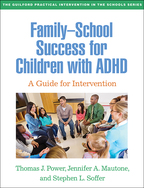Family-School Success for Children with ADHD
A Guide for Intervention
Thomas J. Power, Jennifer A. Mautone, and Stephen L. Soffer
This title is part of The Guilford Practical Intervention in the Schools Series, edited by Sandra M. Chafouleas.
“This book is a 'must have' for clinicians, researchers, and trainers concerned with supporting children with ADHD. FSS is a highly innovative approach that integrates research-based practices and encourages their delivery in the context of positive family–school relationships. The comprehensive tools provided in the book—including handouts, fidelity checklists, evaluation measures, and tips for adaptations—ensure seamless and effective implementation. I can't think of any intervention more important than FSS for students with ADHD!”
—Susan M. Sheridan, PhD, Director, Nebraska Center for Research on Children, Youth, Families and Schools, University of Nebraska–Lincoln
“Based on decades of state-of-the-art research and written by leaders in the field, this book leverages the relationship between parents and school personnel to enhance academic and social–emotional functioning for children with ADHD. Few ADHD resources integrate home and school interventions like this one, making it a unique and necessary manual for therapists and school mental health providers.”
—Andrea Chronis-Tuscano, PhD, Joel and Kim Feller Endowed Professor, Department of Psychology, University of Maryland, College Park
“An exceptional manual for mental health clinicians treating childhood ADHD. The guide is well organized and highly usable, with clear and succinct session summaries, handouts, and tools for fidelity and progress monitoring. The focus on optimizing treatment engagement through parent self-discovery and empowerment is exemplary, and is facilitated by useful scripted prompts and troubleshooting tips.”
—Linda J. Pfiffner, PhD, Department of Psychiatry and Behavioral Sciences, University of California, San Francisco
“The authors generously share their expertise and tips from 25 years of pioneering effective family-based services for children with ADHD. FSS is a manualized intervention that can be delivered in its entirety or adapted as appropriate for a given circumstance. Exemplifying cultural humility, the authors recognize that parenting practices are not one-size-fits-all, and instead use motivational interviewing strategies to ensure fit of intervention elements with families' values and goals. Busy practitioners will benefit from numerous ready-to-use handouts that communicate key points from each session and provide between-session application activities.”
—Shannon Suldo, PhD, Director of Clinical Training, School Psychology Program, University of South Florida
“Power and colleagues have built on the earlier Homework Success Program to offer a compelling, empirically based approach to working with families and children with ADHD and facilitating family–school collaboration. This book provides thorough background information about FSS, a program manual and supporting materials, and guidelines for adapting FSS for use across different settings. Along with being an excellent addition to the toolkits of established practitioners, this is a valuable resource for trainees developing skills to work with families of children and adolescents with ADHD.”
—Robert J. Volpe, PhD, Department of Applied Psychology, Northeastern University
Table of Contents
PrefaceI. Foundations of the Family–School Success Program
2. Theoretical and Empirical Justification for Family–School Success
3. Setting Up the Family–School Success Program
4. Conducting Family–School Success Sessions
II. The Family–School Success Manual
5. FSS Session 1: Introduction to the Family–School Success Program
6. FSS Session 2: Strengthening Family Relationships
7. FSS Session 3: Understanding the Basics of Behavior Management
8. FSS Session 4: Preparing for Family–School Collaboration
9. FSS Session 5: Introducing the Token Economy
10. FSS Session 6: Understanding the Function of Behavior and Establishing the Homework Ritual
11. FSS Session 7: Managing Time and Goal Setting
12. FSS Session 8: Using Punishment Successfully
13. FSS Session 9: Planning for Future Success
III. Adaptations and Evaluation
14. Adaptations across Settings, Populations, and Time of Year
15. Assessing Intervention Fidelity, Engagement, and Outcomes, with Jenelle Nissley-Tsiopinis
16. Assessing the Outcomes of Family–School Success, with Yael Gross and Katie Tremont
Appendix A. Parent Handouts and Homework Assignments
Appendix B. Fidelity Checklists
Appendix C. Outcome Measures
References
Index
About the Authors
Thomas J. Power, PhD, ABPP, is Professor of School Psychology in Pediatrics and Psychiatry at the Perelman School of Medicine at the University of Pennsylvania and Distinguished Endowed Chair in the Department of Pediatrics at Children’s Hospital of Philadelphia (CHOP). Dr. Power has been Director of the Center for Management of ADHD at CHOP since 1999. He spent many years providing services to children and families coping with attention-deficit/hyperactivity disorder (ADHD) and has been dedicated to interprofessional training and intervention research throughout his career. Dr. Power is a past editor of School Psychology Review and was a member of the Society for Developmental and Behavioral Pediatrics committee that prepared the Clinical Practice Guideline for the Assessment and Treatment of Children and Adolescents with Complex ADHD.Jennifer A. Mautone, PhD, ABPP, is Associate Professor of School Psychology in Psychiatry at the Perelman School of Medicine at the University of Pennsylvania and Director of Primary Care Behavioral Health Research in the Department of Child and Adolescent Psychiatry and Behavioral Sciences at Children’s Hospital of Philadelphia (CHOP). Dr. Mautone served as founding Co-Director of Healthy Minds, Healthy Kids, the integrated behavioral health in primary care program at CHOP. Her research and clinical practice focus on improving connections between systems of care (for example, families, schools, health systems) and increasing equitable access to and utilization of high-quality, culturally responsive behavioral health services for children and adolescents. Dr. Mautone has published over 50 peer-reviewed papers in scientific journals.
Stephen L. Soffer, PhD, is Professor of Clinical Psychiatry at the Perelman School of Medicine at the University of Pennsylvania. At Children’s Hospital of Philadelphia (CHOP), he is Co-Chief, Division of Outpatient Behavioral Health in the Department of Child and Adolescent Psychiatry and Behavioral Sciences; Training Director of the Psychology Internship Program; and a psychologist at the Center for Management of ADHD. In addition to caring for children and families, Dr. Soffer is actively involved in clinical teaching of psychology and psychiatry trainees. He has a long-standing commitment to developing and implementing suicide prevention initiatives, including expanding the use of evidence-based practice in youth suicide risk assessment and intervention in pediatric health care settings.

